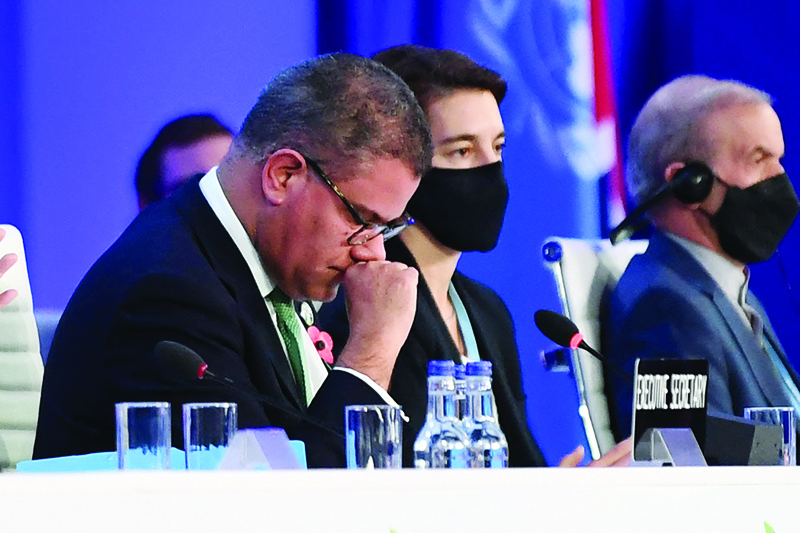 GLASGOW: Britain's President for COP26 Alok Sharma reacts as he makes his concluding remarks during the COP26 UN Climate Change Conference on Saturday. - AFP
GLASGOW: Britain's President for COP26 Alok Sharma reacts as he makes his concluding remarks during the COP26 UN Climate Change Conference on Saturday. - AFP
GLASGOW: The world must act quickly to cut greenhouse gas emissions and avoid "catastrophic" global warming, scientists and politicians warned after nearly 200 countries reached a last-minute agreement in Glasgow on Saturday. After two weeks of non-stop negotiations, almost all the world's nations have agreed on a compromise to speed up the fight against rising temperatures.
But the deals stuck under the "Glasgow Pact" will not result in limiting global warming to 1.5°C above pre-industrial levels, the most ambitious objective of the 2015 Paris Agreement. "Climate catastrophe is still knocking on the door," warned UN boss Antonio Guterres. "We have kept 1.5 within reach, but the pulse is weak," said Alok Sharma, Britain's COP26 president who has been overseeing the conference in the country's role as host.
COP27 is to be held in Egypt next November. Joeri Rogelj, director of research at the Grantham Institute, Imperial College London, said: "We are looking in the right direction, but we need to start moving and global emissions need to decline, immediately, rapidly, and extremely urgently." The agreement in Glasgow was the first time after 25 previous conferences that the words "fossil fuels" and "coal" - the main culprits of global warming - have made it into the final text.
"This is long overdue but very welcome," said Chris Littlecott, fossil fuel transition specialist at the think tank E3G. Their inclusion "confirms that coal is on the conveyor belt to the great trash compactor of history". He said the world now has a decade "to accelerate coal's demise and expand efforts to oil and gas too".
Recognizing coal and oil by name in the text was a painful process, with India and China managing at the last moment to further soften the wording to "phase down" instead of "phase out". The concession prompted a tearful Sharma to apologize to the world. Beijing's shift came as it announced on Wednesday a surprise deal with the United States, the second-largest emitter of greenhouse gases after China. President Joe Biden, who at the start of the summit lashed out at his Chinese counterpart Xi Jinping for his absence in Glasgow, is due to hold a video conference with him today.
Beijing needs to deliver on promises made in Glasgow "with action - through putting an expiry date on domestic coal, said Byford Tsang of environmental group E3G. "How countries establish new cooperation to deliver more short-term action over the next 12 months will be the real test of success at Glasgow," the group said, highlighting other COP26 promises on reducing methane emissions, deforestation and the financing of the fossil fuel industry.
If countries, particularly the major emitters, stick to their incremental, "business-as-usual" policies, they will "condemn current and future generations to a world of untold suffering and harm", warned the Union of Concerned Scientists (UCS). The poorest countries, those least responsible for global warming but which are bearing its brunt, fought in Glasgow to obtain specific funding for "loss and damage".
But they reluctantly gave in, agreeing to further dialogue so as not to jeopardize the broader fight against global warming. "We always knew that Glasgow was not the finish line," said US envoy John Kerry on Saturday evening. It was a sentiment echoed by other rich-world politicians. "Now is the time for action and implementation," Dutch premier Mark Rutte tweeted.
French Environment Minister Barbara Pompili said that while COP26 was "far from having saved the planet, it put it on the right track." Pompili told RTL radio that while the final declaration was "not the most ambitious in the world" it represented a "compromise" that had at one point looked elusive. "We have a deal, we have the Glasgow Pact and I can tell you that until last night that was not a given." But Swedish environmental activist Greta Thunberg said the talks had achieved nothing but "blah, blah, blah", echoing earlier comments.
The final text urged nations to accelerate efforts to "phase down" unfiltered coal and "phase out" inefficient fossil fuel subsidies. Large emitters China and India had opposed the mention of the polluting fuels, and the language in the final text was significantly more nuanced than earlier drafts. The deal also called on all countries to accelerate their emissions cuts by submitting new national plans by 2022, three years earlier than agreed in Paris.
But after resistance from rich nations led by the United States and EU, the text omitted any reference to a specific finance facility for the loss and damage climate change has already caused in the developing world. It instead only promised future "dialogue" on the subject. "For some loss and damage may be the beginning of conversation and dialogue," said Shauna Aminath, the Maldives environment minister. "But for us this is a matter of survival."
Although host Britain said it wanted COP26 to keep the 1.5C temperature cap in reach, a UN scientific assessment last week said countries' latest climate plans put Earth on course to heat 2.7C. The text noted "with deep regret" that wealthy nations had also failed to stump up a separate annual sum of $100 billion they promised over a decade ago. It urged countries to pay up "urgently and through 2025". It also promised to double finance to help developing countries adapt to rising temperatures by the same date. - AFP




